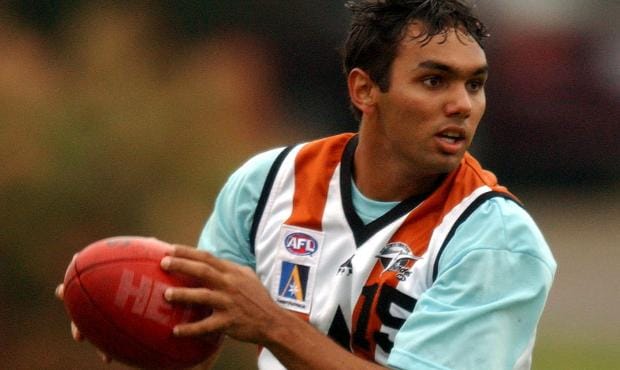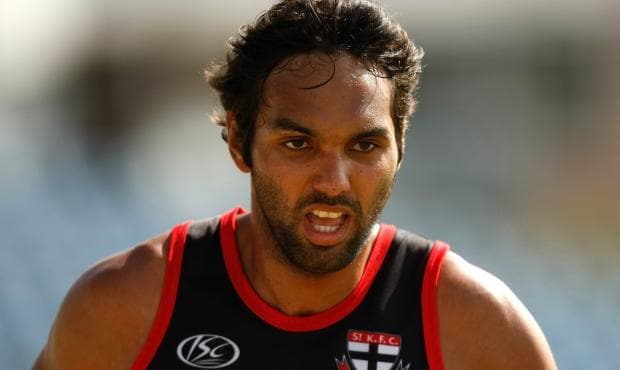XAVIER Clarke had always planned to return home to Darwin. It was just a matter of the right opportunity presenting itself at the right time.
And now it has.
The former St Kilda and Brisbane Lions player has been appointed coach of Northern Territory Thunder – which competes in the North East Australian Football League – for the next two seasons.
"To come home in such an exciting role, I couldn't have scripted it much better myself," Clarke told AFL.com.au.
"We've got a lot of hard work in front of us, but I'm loving it."
The 30-year-old believes the full-time position will have him well equipped for a return to the AFL system in a coaching or development capacity.
Clarke could already be working at an AFL club, if he chose to.
When his injury-plagued 106-game career finished at the end of 2011, he knocked back some development coaching roles to gain broader experience in the industry.
To avoid dwelling on the premature end to his playing days, Clarke deliberately kept himself busy.
He initially continued as an opposition analyst for the Lions (a position he held in 2011 and 2012) and also took on a role helping indigenous players transition out of the game.
Clarke then spent 14 months as the AFL's national indigenous programs coordinator before being appointed NT Thunder coach in November.
The new role will certainly throw up challenges that are foreign to most coaches and perhaps unique for a first-time mentor.
One of Clarke's trickiest tasks is coping with the timing of the different football seasons in the Top End.
The local Northern Territory league, from which the Thunder sources the majority of its players, runs during the northern wet season from October to March, while the NEAFL season operates for the remainder of the year like the AFL.
Although he admits it's a "balancing act", Clarke insists his job is made easier by the fact the fledgling club is entering its sixth season and has developed a proven player-management system, as evidenced by its 2011 premiership and 2012 Grand Final appearance.
Clarke sees his role as being far broader than onfield results. Not only does he want to lift the Thunder back into flag contention (they finished seventh last year), but also develop future AFL players and even help NT communities along the way.
It's this kind of holistic thinking that prompted Clarke some years ago to establish, with former St Kilda teammate Allan Murray, the now defunct Unity Foundation, which delivered leadership programs and housing for disadvantaged indigenous youth.
The onfield quest will be helped by the recruitment of former Essendon forward Alwyn Davey, and there is potential for more quality signings with the Thunder playing list to be finalised by the end of January.
More Saturday Spotlights
One player who won't join Clarke in his first season is his younger brother Raphael, who was delisted by St Kilda at the end of 2012 after 85 games. "Raph" won't be going home just yet, deciding instead to finish the final year of a building apprenticeship in Melbourne.
The brothers are extremely close – they were housemates in Melbourne and also worked together in the AFL's indigenous programs.
"I've told Raph I don't have a spot for him, so that's why he's staying in Melbourne," Xavier jokes. "No, hopefully we'll get him up here next year."
There are four Clarke brothers in total – the others are Andrew and Marius, the eldest and youngest respectively – and they all plan to play together in the same team for the first time in the St Marys reserves in the next NTFL season.
Their sister Frances recently gave birth to the clan's first grandchild – another development Clarke is excited about.
A fresh-faced Xavier Clarke at the AFL draft camp in 2001. Picture: AFL Media
Clarke says each of his coaches – Grant Thomas and Ross Lyon at St Kilda, and Michael Voss in Brisbane – have had significant influences on him, but he plans to be his own man.
However, Clarke expects to regularly use the Lyonism, "Defenders defend," because "NT boys generally don't like to defend; it's all one-way run."
Clarke has adopted very much a new-age approach to coaching.
"I'm not a domineering coach who screams at the group and throws the magnetic board; I'm more about building relationships with players and developing them one-on-one and getting them onside," he says.
"Us coaches will lead the way but I'm one to put ownership back on the individual and the playing group to drive the program."
As a player himself, Clarke boasted great talent – he was recruited from NTFL powerhouse St Marys with the No.5 pick in the 2001 National Draft – but played his last game at just 26.
He wouldn't wish his playing setbacks on anyone, but believes they will help him as a coach.
"Getting through my injuries and hardships have helped me not just in footy but in life in general. It makes you more empathetic and you take people's thoughts into consideration more," he says.
"I was lucky to have great support around me, but it was four or five years of back-to-back setbacks where I had to keep getting back up.
"I probably didn't reach my full potential and my career didn't play out the way I wanted it to, but I did everything I possibly could. It wasn't for lack of effort.
"Some of the things I've faced have been pretty tough and they'll definitely hold me in good stead (as a coach)."
And he has faced far more serious issues than his own injuries.
Xavier Clark's body was rarely able to withstand the rigours of AFL football. Picture: AFL Media
In November 2008 his father Xavier Clarke senior – a St Marys triple-premiership star – died at 55 after a long battle with cancer.
"After that, I did my knee that pre-season, then I went to Brisbane and did my other knee, and then I split the tendons in my foot. It was never-ending. I certainly understand the tough times players go through," Clarke says.
During his time at the AFL, Clarke was a member of a think-tank that looked into why there are so few indigenous coaches in the AFL.
"We put it down to a couple of things: it was either attitude or opportunity," he says.
Clarke, who also helped set up the AFL's indigenous coaching academy last year, hopes his generation is the one that breaks through.
"Indigenous players make up 9 per cent of AFL lists but there are only two indigenous coaches at AFL clubs: Roger Hayden (development at Fremantle) and Andy Lovell (assistant at Gold Coast). We'd like to see that number increase.
"Micky O'Loughlin has moved to the Swans Academy, Chris Johnson is coaching the AIS (AFL Academy) level one squad, Aaron Davey has taken a (mentoring) role with Richmond's VFL side. When Adam Goodes retires, a lot of clubs will want him. (Geelong player) Mathew Stokes is another one who could easily become an assistant coach.
"They'll be very good, given the opportunity."
SIX POINTERS with Xavier Clarke
What do you like most about the game?
"As an indigenous person, the game gives us a phenomenal opportunity to not only showcase our skills but also to help bring about social change in the community. It's so much more than a game."
What don't you like?
"Keyboard warriors. People who sit at home and pick off players on social media but don't know the full story of what's going on in players' lives. Some players have gotten into trouble because people have had a go at them without knowing all the facts and they've had a go back. Some players get through it and it doesn't bother them, but other players really struggle with it."
What would you change about the game?
"I'd like to see more NT players drafted! I think the game is going in a great direction and the young players coming into it are extremely fortunate."
Who is your favourite player and why?
"When I was growing up it was Michael Long because of the St Marys connection and the fact he was a brilliant player. My favourite current player is another St Marys boy, Cyril (Rioli). As a youngster I actually played senior NTFL footy with his dad, who is also named Cyril, and at that stage young Cyril was about eight and he was kicking banana goals from the boundary line. He's got real X-factor."
How many operations have you had?
"Three knee recos – two on the right and one on the left – as well as a tendon reco in my foot, both of my hips, and a heap of minor back stuff with epidurals, although they're not operations. If I had my time again I wouldn't have come back so quickly from my first knee reco in 2009. I pushed it too much too soon, which probably delayed my comeback at Brisbane."
How will your former clubs – St Kilda and the Brisbane Lions – go this year?
"It's hard to tell where the Saints are at, but I think they might struggle for a little while. It'll be interesting to see what Alan Richardson puts in place. Losing Nicky Dal Santo will leave a big hole in the midfield, and (Ben) McEvoy is a massive loss.
"I think the Lions might jump out of the blocks early and go OK. From all reports Justin Leppitsch will be a fantastic coach and he's got the respect of the playing group. Guys like (Tom) Rockliff and (Jack) Redden and (Daniel) Rich, who have been in the system four or five years, need to take ownership of the club because 'Blacky' (Simon Black) pulled the pin and 'Browny' (Jonathan Brown) isn't going to be around for much longer."




